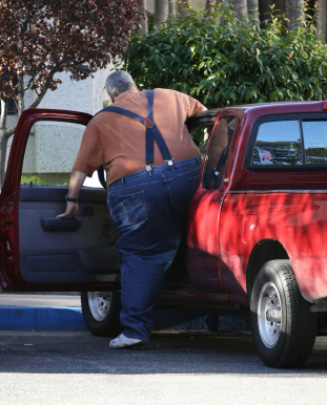University of Illinois study: Driving less can lead to weight loss
University of Illinois study: Driving less can lead to weight loss
John Egan
Want to lose weight and save money on gasoline? Cut back on calories – and on your time behind the wheel.
That’s according to a new study by researchers at the University of Illinois. The study, led by computer science and math professor Sheldon Jacobson, found that daily car travel and daily calorie consumption are both related to body weight. Reducing either one, even by a small amount, is linked to a decrease in someone’s body mass index (BMI).
“An easy way to be more physically active is to spend less time in an automobile. Any time a person sits behind the wheel of a car, it’s one of the most docile activities they can do in a day,” Jacobson says in a news release. “The automobile is the quickest mode of transportation we have. But a consequence of this need for speed in getting things done may be the obesity epidemic.”
 The study – relying on data regarding average BMI, calorie consumption and driving habits – was published in the journal Preventive Medicine.
The study – relying on data regarding average BMI, calorie consumption and driving habits – was published in the journal Preventive Medicine.
Researchers discovered that that if all U.S. adults drove just 1 mile less each day, the national average BMI would decline by 0.21 kilograms after six years. The national average BMI in 2010 was 27.55. By comparison, cutting 100 calories a day would be associated with a 0.16 kilogram decrease in the national average BMI after three years.
“One mile is really not much,” says graduate student Banafsheh Behzad, co-author of the study. “If they would just consider even taking the bus, walking the distance to the bus stop could have an impact like eating 100 calories less per day. The main thing is paying attention to (how) caloric intake and moving more, together, can help reduce BMI.”
If drivers nationwide traveled 1 mile less by car each day, not only would gas consumption fall, but annual health care costs could drop by billions of dollars as fewer Americans would be classified as obese or overweight, according to Jacobson’s estimates.
“The most important thing for people to learn from this study is that they have a choice,” Jacobson says. “One has to be just as careful about when you choose to drive as when you choose to eat. These small changes in our driving and dietary habits can lead to long-term significant changes in obesity issues.”
Jacobson led a study released in 2011 that found a connection between the surge in use of passenger cars in the U.S. and the growth in national obesity rates. The study was published in the journal Transport Policy.
“In places like China and India, where the automobile is increasingly competing with cycling and walking as a mode of transportation, they are observing more obesity,” Jacobson said in 2011.
